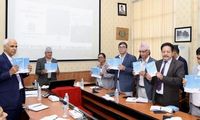KATHMANDU, APRIL 20 - The National Planning Commission (NPC) has projected that Nepal will require an investment of Rs 21.165 trillion to implement the Sustainable Development Goals (SDGs) by 2030. Unveiling a comprehensive report titled "Sustainable Development Goals: Needs Identification, Cost Estimation, and Fiscal Strategy, 2081 BS" in Kathmandu today, the NPC detailed that an average of Rs 3.023 trillion will be needed annually from 2024 to 2030 to meet the global development agenda.
The report identifies Goal 9, which focuses on industry, innovation, and infrastructure, as the most costly, demanding 24 percent of the total budget. Following closely, Goal 7, which pertains to affordable and clean energy, will require 12 percent, while Goal 1, aimed at poverty alleviation, will need 11 percent of the total investment.
According to the NPC, achieving the SDGs will necessitate 45.4 percent of Nepal's Gross Domestic Product (GDP) over the designated period. To meet this financial need, the report outlines a strategy for mobilizing resources from various sectors, including public, private, cooperative, and household levels.
The public sector is expected to contribute 57.5 percent of the total investment, with the breakdown showing that 70 percent will come from the federal government, 9 percent from provincial governments, and 21 percent from local governments. The private sector is projected to contribute 34.35 percent, while the non-government sector is expected to provide 4.18 percent. Households are estimated to invest 3.95 percent in this ambitious plan.
NPC Vice Chair Prof. Dr. Shiva Raj Adhikari, who launched the report, stated, "We are working to identify both our needs and the resources required to meet them. This report introduces new funding sources and redefines the roles of all three tiers of government, alongside the private and cooperative sectors, to help achieve the SDGs."
The NPC emphasized the necessity of tapping into blended finance, climate finance, and other innovative financial mechanisms in addition to traditional funding avenues. The document underscores the need for comprehensive economic, policy, and legal reforms to bridge the long-term financial gap.
Strategic interventions suggested in the report include sectoral policy reforms, prioritizing the SDGs, improving resource mobilization, increasing foreign aid, enhancing cost-efficiency in public spending, and ensuring better access to technology.
Notably, the NPC developed the report considering various evolving challenges, such as the COVID-19 pandemic, demographic changes, migration, urbanization, rising inequality, climate change, and the impacts of conflict, particularly in the context of Nepal's federal system.
In conjunction with the SDG report, the NPC also launched a book titled "Method of Employing Key Economic Indicators," aimed at promoting the effective and accurate use of commonly referenced economic data.
This extensive investment plan illustrates Nepal's commitment to achieving the SDGs and highlights the collaborative effort required from all sectors of society to address pressing developmental challenges.





